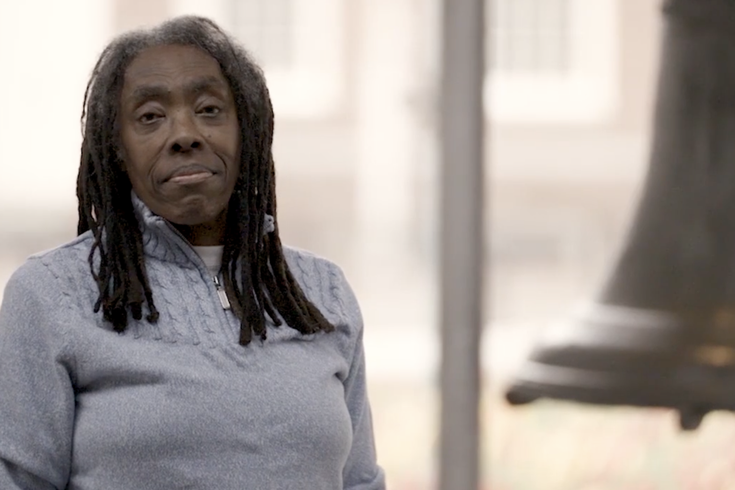
October 19, 2022
 Philly on Fire/Vimeo
Philly on Fire/Vimeo
Ramona Africa, the only living survivor of the 1985 MOVE bombing, is featured in the Library of Congress Lavine/Ken Burns Prize-winning documentary 'Philly on Fire.'
An upcoming film exploring the 1985 MOVE bombing has received a top prize from the Library of Congress and famed documentarian Ken Burns.
"Philly on Fire" was one of two winners of the Library of Congress Lavine/Ken Burns Prize for Film, an award for unfinished documentaries that use original research and archival materials to tell stories from American history. The $200,000 prize is meant to help the filmmakers finish production and distribution.
For the first time in the prize's four-year history, first place went to two different movies. The other winner was "Bella!," a documentary about feminist Congresswoman Bella Abzug from "The Amazing Nina Simone" director Jeff L. Lieberman.
"With all the extraordinary films we received this year, choosing just one winner proved to be an impossible task," Burns said. "We're honored to provide the filmmakers with funds to help finish their films and share them with the public."
"Philly on Fire" examines the 1985 Philadelphia police bombing of a row house in West Philly through the eyes of a MOVE member hiding in the house, a cop involved in the effort to bomb it and a father who nearly lost his son that day. It is directed by Ross Hockrow and Tommy Walker, who previously collaborated on "Kaepernick & America."
For the duo, telling this story has been a longtime passion project.
"This is the first film I ever wanted to make," Hockrow told PhillyVoice. "I wasn't even a filmmaker, I was a professional poker player when I heard people talking about [the bombing] at the poker table, and I was like, man, that's crazy, how have I never heard that story before? I feel like it should be taught in US history."
"As I looked deeper into it, I realized, okay, this is a story that everyone just wants to ignore forever. And so that was the beginning of it. This is the story that made me become a filmmaker, so I always kept it in the back of my mind."
Walker, by contrast, remembers watching the news live at his parents' home in Washington, DC just after graduating college.
"I think the thing that has always blown me away is it was such a massive event, one of those things that really floors you, and then suddenly, the story wasn't being told anymore," he told PhillyVoice. "It almost evaporated from the radar."
The MOVE bombing was the shocking result of a standoff between Philadelphia police and members of MOVE, a Black liberation group which lived communally and adopted the last name of founder John Africa. Police arrived at the MOVE headquarters on Osage Avenue on May 13, 1985 intending to arrest several members, who refused to exit the building. Gunfire was exchanged as police fired "over 10,000 rounds of ammunition in under 90 minutes at a row house containing children," according to the Philadelphia Special Investigation Commission. Tear gas and high-press water hoses also were deployed.
The conflict lasted nearly all day, ending only when police dropped a satchel bomb with C4 explosives from a helicopter. The blast killed 11 people, including five children, and destroyed 61 homes.
Nearly 40 years later, Philadelphia is still dealing with the aftermath. Last year, fresh scandal erupted when it was revealed that Philadelphia Health Commissioner Dr. Thomas Farley had approved the cremation and disposal of remains of MOVE victims without notifying the Africa family or other city officials. Farley later resigned, but it was later discovered that the remains had not been cremated. They were returned to the Africa family.
Earlier in the year, the University of Pennsylvania apologized for housing the remains of a MOVE bombing victim in the Penn Museum for decades. They also were released to the family.
"Philly on Fire" will include original interviews with Ramona Africa, the only adult survivor of the MOVE bombing, and Jim Berghaier, one of the 500 police officers on the scene. Andino Ward, whose son Birdie Africa was the only child survivor of the attack, is also featured. Birdie died in 2013.
Hockrow says they plan to use the grant money mainly to license archival footage, as well as final processes like color correction. "Documentaries are much more expensive than people realize," Walker added.
While there's no currently no distributor for "Philly on Fire," its directors hope to get it broadcast on cable TV or a streaming service. Even viewers who know the story, like Hockrow, were surprised by the details unearthed.
"What's really lost is this isn't just about a day," Hockrow said. "[You might think] I got this, there's this story where they drop a bomb on a row house and burn down three city blocks, but that's not the craziest part."
The trailer for "Philly on Fire" is available on Vimeo:
Follow Kristin & PhillyVoice on Twitter: @kristin_hunt
| @thePhillyVoice
Like us on Facebook: PhillyVoice
Have a news tip? Let us know.